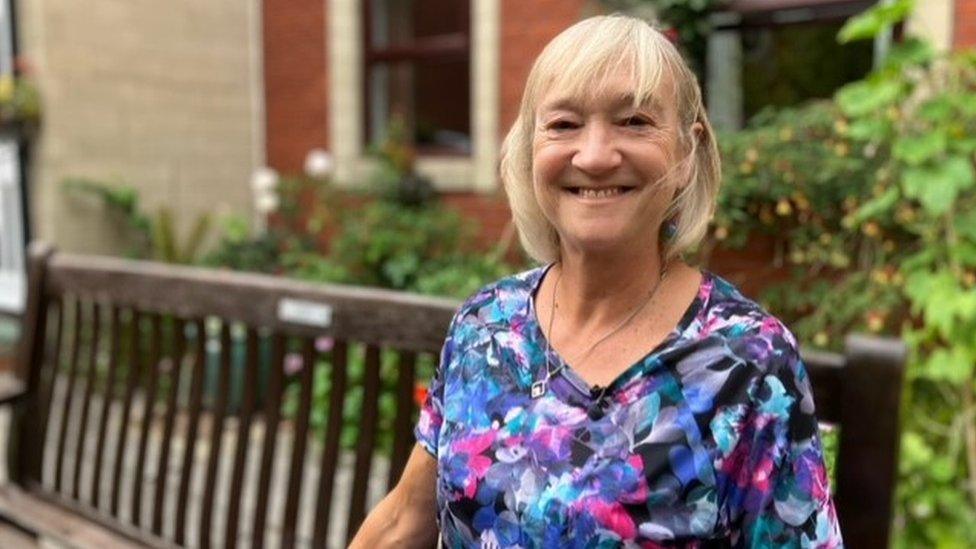Hip fracture care too slow in some hospitals, study says
- Published

Hilary Buck had a full hip replacement after an accident on a camping trip
There are big differences in how well patients with hip fractures are cared for by hospitals in England and Wales, a Bristol University study says.
In some hospitals one in 10 people died within a month of surgery - more than three times worse than in the best.
Getting patients into theatre quickly and out of bed the next day for physio are key ways to improve care.
People should receive the same, high-quality care wherever they live, the researchers said.
An NHS spokesperson said hip fracture care in the UK had "seen dramatic improvements in recent years".
Hip fractures tend to affect older people who are frail, have poor balance or other serious health conditions, and surgery is almost always needed.
Many teams within a hospital - including continuing support and physio after they have returned home - are involved in their care.
"If you get it right for older people with hip fractures, you're probably getting it right for older people in general," says Prof Celia Gregson, who led the study of more than 170,700 patients in 172 hospitals, external between 2016 and 2019.

'Huge shock to the system'
Hilary Buck, 62, from Bath, fractured her hip on a camping trip with friends last year, tripping over a tent guy rope.
The fall left her in excruciating pain but it was four days before she was transferred to a hospital where she could have an operation.
She had a full hip replacement, with bolts and pins inserted in her pelvis. After the accident, she was diagnosed with osteoporosis, which causes the bones to weaken and break more easily.
"This was a huge shock to the system, and it has completely changed my life in so many ways," Hilary says.
"I'm slowly recovering but there is still a lot of stuff I can't do.
"I have to be much more cautious in my approach to life generally and can't do some of the sports I used to, such as skiing, tennis and kayaking."
Hilary went home three weeks after her fall and had a visit from an occupation therapist an hour later. Physios and carers were also regularly on hand to help.
"I received a lot of help straight away and that enabled me to live independently again," she says.

The Bristol study found some hospitals managed to send hip-fracture patients home 12 days after surgery, on average, while for others the average stay was more than a month.
The risk of a patient dying within 30 days after surgery ranged from 3% to more than 10% and the chances of being readmitted from 3% to nearly a third.
There were three main things hospitals should do to provide better care, the researchers said:
get patients to surgery within 36 hours of being admitted to hospital
get patients back on their feet with physiotherapy the day after surgery
hold staff meetings to discuss feedback from patients
If hospital staff got 90% of hip fracture patients out of bed the day after surgery, those patients spent two days fewer in hospital compared with hospitals that took longer.
The researchers calculated that meeting that aim would save 16,550 bed-days a year in England and Wales.
'Worrying state of care'
Prof Gregson said arranging continuing care was also vital for patient recovery.
"The fact that some hospitals discharge patients into the community without knowing when follow-on care might start is a sad reminder of how disjointed hospital and community services can be across the country," she said.
The Covid pandemic put extra strain on the NHS and is likely to have made the situation worse, she added, with the main issue still being getting people who have broken their hip to theatre quickly.
So why do some hospitals look after these patients better than others?
"A lot of it is how hospitals are set up," Prof Gregson said. "Strong leadership is needed - and the right people to drive the improvements."
Different hospitals will have different pressures and different areas that could be improved.
The data is being fed into a new toolkit that will allow individual hospitals to analyse their performance on hip-fracture care and provide ammunition for funding more physios, for example.
Deborah Alsina, from Versus Arthritis, which funded the study, said the research highlighted "the worrying state of care for older people who break their hip".
"Quality of care... is a key indicator of whether we're getting older people's care right in general. This research suggests we are not."
An older person's risk of dying from a broken hip has halved since 2007, the NHS said.
"While some variation is to be expected due to multiple and complex factors, we are continually monitoring data to bear down on unwarranted variation and inequalities, as well as supporting the early identification of those most at risk of falls and fracture so they can get help to avoid injury in the first place," the spokesperson said.